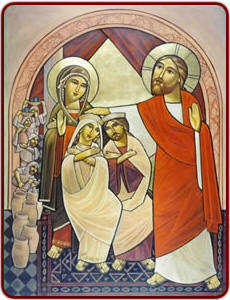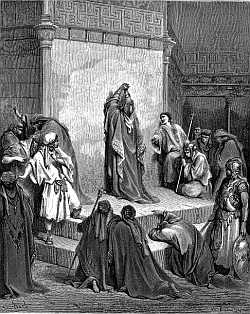Now it came to pass, as they went, that he entered into a certain village: and a certain woman named Martha received him into her house. And she had a sister called Mary, which also sat at Jesus’ feet, and heard his word. But Martha was cumbered about much serving, and came to him, and said, Lord, dost thou not care that my sister hath left me to serve alone? bid her therefore that she help me. And Jesus answered and said unto her, Martha, Martha, thou art careful and troubled about many things: But one thing is needful: and Mary hath chosen that good part, which shall not be taken away from her. — The Gospel of Jesus Christ, According to St. Luke, Chapter 10: 38-42.
One of the more popular books treating one notion of simplicity is the Tao of Pooh. It is easy to make fun of such writing. After all, one of the easiest critiques of that book is that it attempts to teach simplicity not by leaving Pooh alone but by turning him into a philosophical principle; much more enlightening are Milne’s actual tales from the Hundred Acre Wood. It is a deprivation of culture when such things as Pooh and Narnia and Hobbits are relegated to the category of children’s stories, or when that is thought to make them irrelevant to adult life. The notion that being an adult involves a certain complication carries some truth, but our culture equates that with the development of guile, of cynicism, of the precocious loss of innocence – of worldliness. Adult life, as represented in the culture, is the life of the flight from Eden. And therefore the innocence of the garden is associated with childhood. Indeed, to find innocence, to revel in it, one must necessarily be thought childish and perhaps love childish things. To be open like a child, exposed, honest, sincere, trusting – these things are though unworthy of the man or woman who has ‘come of age’. Our rite of passage is not a test of the simple virtues of bravery or wisdom, but the graduation to meaningless sex, relationships of distrust, exaltation of personal gain, and rejection of moral absolutes – the coming to grips with ‘reality’ by which is indicated the signs of death in the world, but by which is meant the acquiescence to death in ourselves – the stripping away of our horror at it – the loss of our repugnance and the growth of our amoral acceptance and then embracing of the mediocrity of horror. In short, to be adult, in our culture, is to no longer believe in God.
To the uneducated, an A is just three sticks. – Pooh
Simplicity in the sense of orthopraxis does not equate with “elementary”. In fact it may be said to that simplicity, in an Orthodox ascetic sense, is the feat or moral sophistication and the culimation of spiritual development. It is not devolving backwards, a reductionism, reducing everything to an “Om” or the obliteration of distinctions, the loss of everything specific. Rather, it is the sight of the Hesychasts, the process of deification, the place of synergy with Christ. The Orthodox ascetic does not fit the stereotype of the quaint, thoughtless follower of blind tradition any more than he or she does the single-minded professional scholar of the Mediaeval West. Nor has he lost his identity in some kind of raw force of energy, dissolved into the ‘one’, as in Eastern mysticism. Likewise simplicity does not mean a disembodied anti-material ahistorical Protestant reductionism, or indeed the whole Western method of reducing everything to a single philosophical principle.
Before beginning a Hunt, it is wise to ask someone what you are looking for before you begin looking for it. – Pooh
Simplicity, rather, is the vision that transforms life into warfare against the passions, mastery of the appetites, the conquest of self, seeking divine light, supreme preference of others, meditation on Christ, union with Him. Rather than dare presume to describe these things, I will point instead to the image of St. Seraphim of Sarov, kneeling in the forest before a paper icon of the Theotokos, held by a tack to a tree, in his own Hundred Acre Wood, if you will. In St. Seraphim, we indeed see the stripping away of things which have no meaning; that is a form of true vision, and that to be sure is simplicity. Simultaneously, we see the fulness of Orthodoxy and Orthopraxis, the multiplication of virtues, the radiant glorification of a man. There is no conflict between the barreness of the monastic cell, or indeed of the wilderness, and the gilded splendour of a magnificent church. There is no opposition between orthodox doctrinal thought and orthodox ascetic praxis. There is no antithesis between the raising of the mind and the deification of the body. Simplicity is not so much a choice of external trappings as an inner discipline requiring the fullness of genuine Orthodox ascesis. Simplicity and purity and humility are bedfellows. It is these things we mean by the word ‘saintly’.
You can’t help respecting anybody who can spell TUESDAY, even if he doesn’t spell it right; but spelling isn’t everything. There are days when spelling Tuesday simply doesn’t count. – Pooh
Since simplicity is a moral ascesis, the intellectual must be humbled before the person who is drawn to God by the heart, and think the other superior, and the needs of the intellect perhaps a necessary weakness, or else he has has lost simplicity and become blind. And neither can the person persuaded in heart think ill of the person who seeks God with his intellect, since then his own thoughts have made his intellect deficient, and he now disguises his deficiency by blending with the general deficiency, as one of the Fathers says. It is neither the intellect nor the heart in itself that is anything, but the object of each. When it turns to contemplate itself, it has become vestigial, masturbatory, devouring itself in a mocking denial of its actual purpose. It is so easy to fall into reveling in one’s intellect or being consumed by one’s feelings, but this is to make man’s interior autonomous, and man a fool.
Owl hasn’t exactly got Brain, but he Knows Things. – Pooh
On the one hand, we may speak of simplicity as an Orthodox virtue. On the other, we must not equate this with the simplicity advocated by heterodox religious philosophy. After all, the simplicity of God is both a truth and a heresy. Genuine theological simplicity preserves the distinctions between the divine persons, energies, and essence, imputing simplicity only to the latter, and then only with the humility of apophasis. Hetereodox notions of simplicity categorize and summarize the divine as a single universal principle of being – a divine monad. It would make sense then, that Orthopraxis must mean something entirely unique by simplicity, as well.
“If the person you are talking to doesn’t appear to be listening, be patient. It may simply be that he has a small piece of fluff in his ear.” – Pooh
Let us then be ‘unblended’, by which we mean both simple and pure – unmixed – unadulterated – impeccable.
Why do we not see even now that the simple and guileless enjoy the common esteem of all? No one envies such a person when he is in prosperity, no one tramples on him when he is in adversity, but all rejoice with him when he does well, and grieve with him in misfortune. On the other hand, whenever a bitter man prospers, one and all lament it, as though some evil thing had happened. Jacob was a guileless man, yet he overcame the treacherous Esau. ‘For wisdom enters not a wicked soul’ (Wisdom 1:4). — St. John Chrysostom
Hold faith and humility fast within you; for through them you will find mercy, help, and words spoken by God in the heart, along with a protector who stands beside you both secretly and manifestly. Do you wish to obtain these things, which are a fountain of life? From the very onset take hold of simplicity. Walk before God in simplicity and not with knowledge. Simplicity is attended by faith; but subtle and intricate deliberations, by conceit; and conceit is attended by separation from God. — The Ascetical Homilies of St. Isaac the Syrian.
Let all of us who wish to attract the Lord to ourselves draw near to Him as disciples to the Master, simply, without hypocrisy, without duplicity or guile, not out of idle curiosity. He Himself is simple and not composite, and He wants souls that come to Him to be simple and guileless. For you will surely never see simplicity bereft of humility. — St. John Climacus, “The Ladder of Divine Ascent,”
Walk before God in simplicity, and not in subtleties of the mind. Simplicity brings faith; but subtle and intricate speculations bring conceit; and conceit brings withdrawal from God. — St. Isaac of Syria
A person can be raised up above the earth by two wings, one is simplicity and the other is purity of heart. You must be simple in your actions and pure in your thoughts and feelings. With a pure heart you’ll seek God and with simplicity you’ll find Him and be glad. A pure heart passes through Heavens gate with ease. — Elder Amphilochios Makris
O Lord and Master of my life, take from me the spirit of sloth, meddling, lust of power and idle talk. But give rather the spirit of chastity, humility, patience and love to Thy servant. Yea, O Lord and King, grant me to see my own sins and not to judge my brother, for Thou art blessed unto ages of ages. Amen. (prostration)
 I once told a friend that I was setting out on a journey to learn to love my wife. I believed that if I learned to love my wife, I would learn to love others. And if I can’t learn to love my wife, I told him, then I fear I will never learn to love anyone. My friend periodically, after long periods of time, writes to ask me if I’ve learned to love my wife. And I have always written back, “Not yet. I think it will take a long time.” Recently, I wrote to him to say:
I once told a friend that I was setting out on a journey to learn to love my wife. I believed that if I learned to love my wife, I would learn to love others. And if I can’t learn to love my wife, I told him, then I fear I will never learn to love anyone. My friend periodically, after long periods of time, writes to ask me if I’ve learned to love my wife. And I have always written back, “Not yet. I think it will take a long time.” Recently, I wrote to him to say: I have found that it is possible for a person to be Orthodox, in the sense that they are baptized, chrismated, do penance, and receive communion, and yet not be Christian. Likewise, it seems possible for an organization to be an Orthodox Church, but not be a Christian community. This will seem controversial, but I think it’s so.
I have found that it is possible for a person to be Orthodox, in the sense that they are baptized, chrismated, do penance, and receive communion, and yet not be Christian. Likewise, it seems possible for an organization to be an Orthodox Church, but not be a Christian community. This will seem controversial, but I think it’s so. I was led to the Faith by a priest who had introduced many others to Orthodoxy as well. I began a series of discussions with a friend who hated Christianity, and over time, he began to soften. I introduced him to my priest, and he completed his conversion. He then began conversations with a younger mutual friend and led him to the Faith along with his wife and several children and became a godparent. They are all Orthodox now. I began another series of conversations, and created a reading society, for a man who likewise had great disdain for Christianity. He considered himself an academic, and I introduced him to the patristic writings of the Orthodox Fathers, the historical writings of Fr. John Romanides, and others. He decided to become a catechumen, and I took him to a priest, and that happened. I spoke with his wife also, and they both converted, received Holy Matrimony, and his children have became cradle Orthodox. In short, generations of people could be written as a geneology of movement into the Faith because of my mentor (and those who led him), and myself in my unworthiness. …
I was led to the Faith by a priest who had introduced many others to Orthodoxy as well. I began a series of discussions with a friend who hated Christianity, and over time, he began to soften. I introduced him to my priest, and he completed his conversion. He then began conversations with a younger mutual friend and led him to the Faith along with his wife and several children and became a godparent. They are all Orthodox now. I began another series of conversations, and created a reading society, for a man who likewise had great disdain for Christianity. He considered himself an academic, and I introduced him to the patristic writings of the Orthodox Fathers, the historical writings of Fr. John Romanides, and others. He decided to become a catechumen, and I took him to a priest, and that happened. I spoke with his wife also, and they both converted, received Holy Matrimony, and his children have became cradle Orthodox. In short, generations of people could be written as a geneology of movement into the Faith because of my mentor (and those who led him), and myself in my unworthiness. … In the field of sociology, much really excellent work has been done on analyzing the polity of cult behavior. The analysis has proceeded quite helpfully across confessional boundaries, to think in terms of cult social behavior, cult attitudes (in terms of social psychology), cult social structures, etc. There have been many studies and many lists of earmarks of cults put out, and some points are controversial, while others have nearly universal agreement. “Nearly”, because of course some groups feel justifiably threatened by the analysis. The analysis can apply to an entire group, to a group within a group, to a mere congregation of something vast and universal, or to an entire confession. The sociological elements are key, not anything like “official” status, sanction, or membership. Your tax-exempt status has no relevance. Likewise it does not assume that all cult or cult-like groups will have all of the elements, so analysis is not intended to be comprehensive, but rather to look for a constellation of attitudes and behaviors that elicit a trend. Here are set of common elements culled from some of this analysis: …
In the field of sociology, much really excellent work has been done on analyzing the polity of cult behavior. The analysis has proceeded quite helpfully across confessional boundaries, to think in terms of cult social behavior, cult attitudes (in terms of social psychology), cult social structures, etc. There have been many studies and many lists of earmarks of cults put out, and some points are controversial, while others have nearly universal agreement. “Nearly”, because of course some groups feel justifiably threatened by the analysis. The analysis can apply to an entire group, to a group within a group, to a mere congregation of something vast and universal, or to an entire confession. The sociological elements are key, not anything like “official” status, sanction, or membership. Your tax-exempt status has no relevance. Likewise it does not assume that all cult or cult-like groups will have all of the elements, so analysis is not intended to be comprehensive, but rather to look for a constellation of attitudes and behaviors that elicit a trend. Here are set of common elements culled from some of this analysis: … for Eunice Cherotich (she is someone I care about in Kenya), for the
for Eunice Cherotich (she is someone I care about in Kenya), for the  Perhaps the extremity of the Fasts are part of the point. I can’t imagine what a “casual” fast would be like, any more than I can imagine a casual feast.
Perhaps the extremity of the Fasts are part of the point. I can’t imagine what a “casual” fast would be like, any more than I can imagine a casual feast.